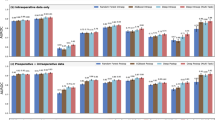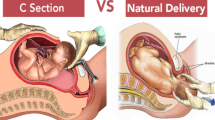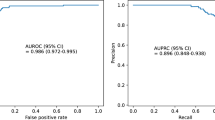Abstract
Health problems are very common among pregnant women, and seemingly normal pregnant women may experience physiological disorders, which can lead to perinatal complications, greatly endangering the health of pregnant women and their newborns. Timely identification, provision of relevant resources, and timely response are the key to preventing serious complications and mortality in delivery women. The current predictive models used in medicine have an imbalance between interpretability and accuracy. In addition, there is a lack of utilization of knowledge in the field of medical expert domain knowledge, which is a waste. The method proposed in this article combines deep learning with regular decision trees to ensure high accuracy while improving its interpretability. In addition, adding expert domain knowledge and providing additional useful information can improve model performance.
J. Wang and G. Wu—Contributed equally to this work.
Access this chapter
Tax calculation will be finalised at checkout
Purchases are for personal use only
Similar content being viewed by others
References
Arabi Belaghi, R., Beyene, J., McDonald, S.D.: Prediction of preterm birth in nulliparous women using logistic regression and machine learning. PLoS ONE 16(6), e0252025 (2021)
Sumathi, A., Meganathan, S.: Gestational diabetes mellitus (GDM data set) (2022). https://doi.org/10.34740/KAGGLE/DSV/3245285, https://www.kaggle.com/dsv/3245285
Bertini, A., Salas, R., Chabert, S., Sobrevia, L., Pardo, F.: Using machine learning to predict complications in pregnancy: a systematic review. Front. Bioeng. Biotechnol. 9, 780389 (2022)
Bogren, M., Denovan, A., Kent, F., Berg, M., Linden, K.: Impact of the helping mothers survive bleeding after birth learning programme on care provider skills and maternal health outcomes in low-income countries—an integrative review. Women Birth 34(5), 425–434 (2021)
Che, Z., Kale, D., Li, W., Bahadori, M.T., Liu, Y.: Deep computational phenotyping. In: Proceedings of the 21th ACM SIGKDD International Conference on Knowledge Discovery and Data Mining, pp. 507–516 (2015)
Chen, J.H., Asch, S.M.: Machine learning and prediction in medicine—beyond the peak of inflated expectations. N. Engl. J. Med. 376(26), 2507 (2017)
Choi, E., Bahadori, M.T., Schuetz, A., Stewart, W.F., Sun, J.: Doctor AI: predicting clinical events via recurrent neural networks. In: Machine Learning for Healthcare Conference, pp. 301–318. PMLR (2016)
Correia, A.H., Lecue, F.: Human-in-the-loop feature selection. In: Proceedings of the AAAI Conference on Artificial Intelligence, vol. 33, pp. 2438–2445 (2019)
Cubillos, G., et al.: Development of machine learning models to predict gestational diabetes risk in the first half of pregnancy. BMC Pregnancy Childbirth 23(1), 1–18 (2023)
Doomah, Y.H., Xu, S.Y., Cao, L.X., Liang, S.L., Nuer-Allornuvor, G.F., Ying, X.Y.: A fuzzy expert system to predict the risk of postpartum hemorrhage. Acta Inform. Med. 27(5), 318 (2019)
Finlayson, K., Crossland, N., Bonet, M., Downe, S.: What matters to women in the postnatal period: a meta-synthesis of qualitative studies. PLoS ONE 15(4), e0231415 (2020)
Frizzell, J.D., et al.: Prediction of 30-day all-cause readmissions in patients hospitalized for heart failure: comparison of machine learning and other statistical approaches. JAMA cardiology 2(2), 204–209 (2017)
Gupta, K., Balyan, K., Lamba, B., Puri, M., Sengupta, D., Kumar, M.: Ultrasound placental image texture analysis using artificial intelligence to predict hypertension in pregnancy. J. Matern. Fetal Neonatal Med. 35(25), 5587–5594 (2022)
Jhee, J.H., et al.: Prediction model development of late-onset preeclampsia using machine learning-based methods. PLoS ONE 14(8), e0221202 (2019)
Krishnamoorthy, S., Liu, Y., Liu, K.: A novel oppositional binary crow search algorithm with optimal machine learning based postpartum hemorrhage prediction model. BMC Pregnancy Childbirth 22(1), 560 (2022)
Lipton, Z.C.: The mythos of model interpretability: in machine learning, the concept of interpretability is both important and slippery. Queue 16(3), 31–57 (2018)
Liu, J., et al.: Machine learning-based prediction of postpartum hemorrhage after vaginal delivery: combining bleeding high risk factors and uterine contraction curve. Arch. Gynecol. Obstet. 306(4), 1015–1025 (2022)
Malacova, E., et al.: Stillbirth risk prediction using machine learning for a large cohort of births from western Australia, 1980–2015. Sci. Rep. 10(1), 5354 (2020)
de Marvao, A., Dawes, T.J., Howard, J.P., O’Regan, D.P.: Artificial intelligence and the cardiologist: what you need to know for 2020. Heart 106(5), 399–400 (2020)
Mennickent, D., Rodríguez, A., Opazo, M., Riedel, C., Castro, E., Eriz-Salinas, A., et al.: Machine learning applied in maternal and fetal health: a narrative review focused on pregnancy diseases and complications. Front. Endocrinol. (Lausanne). 14, 1130139 (2023)
Mennickent, D., Rodríguez, A., Farías-Jofré, M., Araya, J., Guzmán-Gutiérrez, E.: Machine learning-based models for gestational diabetes mellitus prediction before 24–28 weeks of pregnancy: a review. Artif. Intell. Med. 132, 102378 (2022)
Miotto, R., Li, L., Kidd, B.A., Dudley, J.T.: Deep patient: an unsupervised representation to predict the future of patients from the electronic health records. Sci. Rep. 6(1), 1–10 (2016)
Mosaraf, M.P.: Postpartum depression (2023). https://doi.org/10.34740/KAGGLE/DS/2830731, https://www.kaggle.com/ds/2830731
Neary, C., Naheed, S., McLernon, D., Black, M.: Predicting risk of postpartum haemorrhage: a systematic review. BJOG: Int. J. Obstetr. Gynaecol. 128(1), 46–53 (2021)
Ragavi, V., Shanthi, P., Ananth, J., Aswathy, H.: A review on major complications in the pregnancies of women using deep learning algorithms. In: Predicting Pregnancy Complications Through Artificial Intelligence and Machine Learning, pp. 227–243 (2023)
Rezaeian, A., Rezaeian, M., Khatami, S.F., Khorashadizadeh, F., Moghaddam, F.P.: Prediction of mortality of premature neonates using neural network and logistic regression. J. Ambient Intell. Humaniz. Comput. 13(3), 1269–1277 (2022)
Sumathi, A., Meganathan, S.: Ensemble classifier technique to predict gestational diabetes mellitus (GDM). Comput. Syst. Sci. Eng. 40(1), 313–325 (2022)
Sumathi, A., Meganathan, S., Ravisankar, B.V.: An intelligent gestational diabetes diagnosis model using deep stacked autoencoder. Comput. Mater. Continua 69(3), 3109–3126 (2021)
Williams, R.J.: Simple statistical gradient-following algorithms for connectionist reinforcement learning. Mach. Learn. 8, 229–256 (1992)
Wu, M., Hughes, M., Parbhoo, S., Zazzi, M., Roth, V., Doshi-Velez, F.: Beyond sparsity: tree regularization of deep models for interpretability. In: Proceedings of the AAAI Conference on Artificial Intelligence, vol. 32 (2018)
Wu, Y.T., et al.: Early prediction of gestational diabetes mellitus in the Chinese population via advanced machine learning. J. Clin. Endocrinol. Metab. 106(3), e1191–e1205 (2021)
Acknowledgments
This work is supported in part by the National Natural Science Funds for Distinguished Young Scholar under Grant 62325307, in part by the National Nature Science Foundation of China under Grants 62072315, 62073225, 62176164, and 62203134, in part by the Shenzhen Science and Technology Program under grants KCXFZ20230731094001003, JCYJ20210324093808021, and JCYJ2022053110281 7040, in part by the Scientific Instrument Developing Project of Shenzhen University under Grant 2023YQ019.
Author information
Authors and Affiliations
Corresponding authors
Editor information
Editors and Affiliations
Rights and permissions
Copyright information
© 2024 The Author(s), under exclusive license to Springer Nature Singapore Pte Ltd.
About this paper
Cite this paper
Wang, J. et al. (2024). Explainable Deep Learning with Human Feedback for Perioperative Complications Prediction. In: Huang, DS., Zhang, X., Pan, Y. (eds) Advanced Intelligent Computing Technology and Applications. ICIC 2024. Lecture Notes in Computer Science, vol 14863. Springer, Singapore. https://doi.org/10.1007/978-981-97-5581-3_17
Download citation
DOI: https://doi.org/10.1007/978-981-97-5581-3_17
Published:
Publisher Name: Springer, Singapore
Print ISBN: 978-981-97-5580-6
Online ISBN: 978-981-97-5581-3
eBook Packages: Computer ScienceComputer Science (R0)




